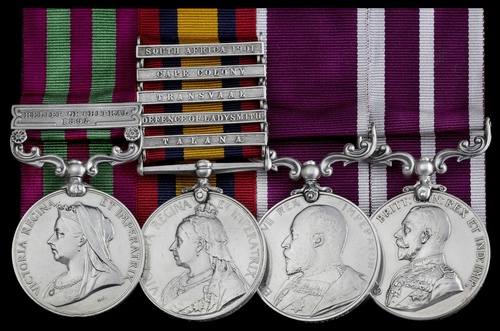
Auction: 19002 - Orders, Decorations and Medals
Lot: 385
(x) A fine Great War M.S.M. group of four awarded to Colour-Sergeant A. Armstrong, London Regiment, late Queensland Defence Force and King's Royal Rifle Corps, who died in 1940 from complications associated with a double hernia caused by 'the strain entailed in giving loud words of command for long periods'
India General Service 1895-1902, 1 clasp, Relief of Chitral 1895 (5543 Corpl. A. Armstrong 1st. Bn. K. R. Rifle Corps); Queen's South Africa 1899-1902, 5 clasps, Talana, Defence of Ladysmith, Transvaal, Cape Colony, South Africa 1901 (5543 Serjt: A. Armstrong. K.R.R.C.); Army L.S. & G.C., E.VII.R. (5543 C. Sjt: A. Armstrong. K.R.R.C.); Army Meritorious Service Medal, G.V.R. (491301 T.S.Mjr. A. Armstrong. 13/Lond: R.), light contact marks, good very fine (4)
M.S.M. London Gazette 22 February 1919.
Alfred Armstrong was born in 1871 at Birmingham and attested for the King's Royal Rifle Corps at Winchester on 31 December 1889. Serving in India from 15 September 1891-9 December 1896 (Medal & clasp), he transferred to South Africa with the 1st Battalion and was promoted Sergeant. Following over 4 years' service in South Africa (Medal & 5 clasps), Armstrong transferred to the Queensland Defence Force and was posted to Australia on 30 March 1901, marrying Mary Ann Grace at Maryborough, Queensland, in November 1901.
Returning home on 31 January 1904, Armstrong saw further service in Malta and Egypt with the King's Royal Rifle Corps, being discharged on termination of his second period of engagement on 30 December 1910 and awarded a pension at the Royal Hospital, Chelsea, of 30d a day for life. Re-enlisting on 4 February 1915, he was appointed Company Sergeant-Major to the 13th (Reserve) Battalion, London Regiment. Serving 3 years and 11 months in England, it was his responsibility to drill and discipline, training N.C.O.s and draft recruits - to the detriment of his own health. Treated at his quarters, he was fitted with a truss but the double hernia continued to cause pain on exertion and he was demobilised on 12 February 1919 and awarded the M.S.M. for home service.
Armstrong subsequently returned to Civil Service and later acted as a messenger for the Air Ministry. He died at Dulwich Hospital on 4 November 1940; sold with extensive copied service papers.
Subject to 5% tax on Hammer Price in addition to 20% VAT on Buyer’s Premium.
Sold for
£520
Starting price
£270




